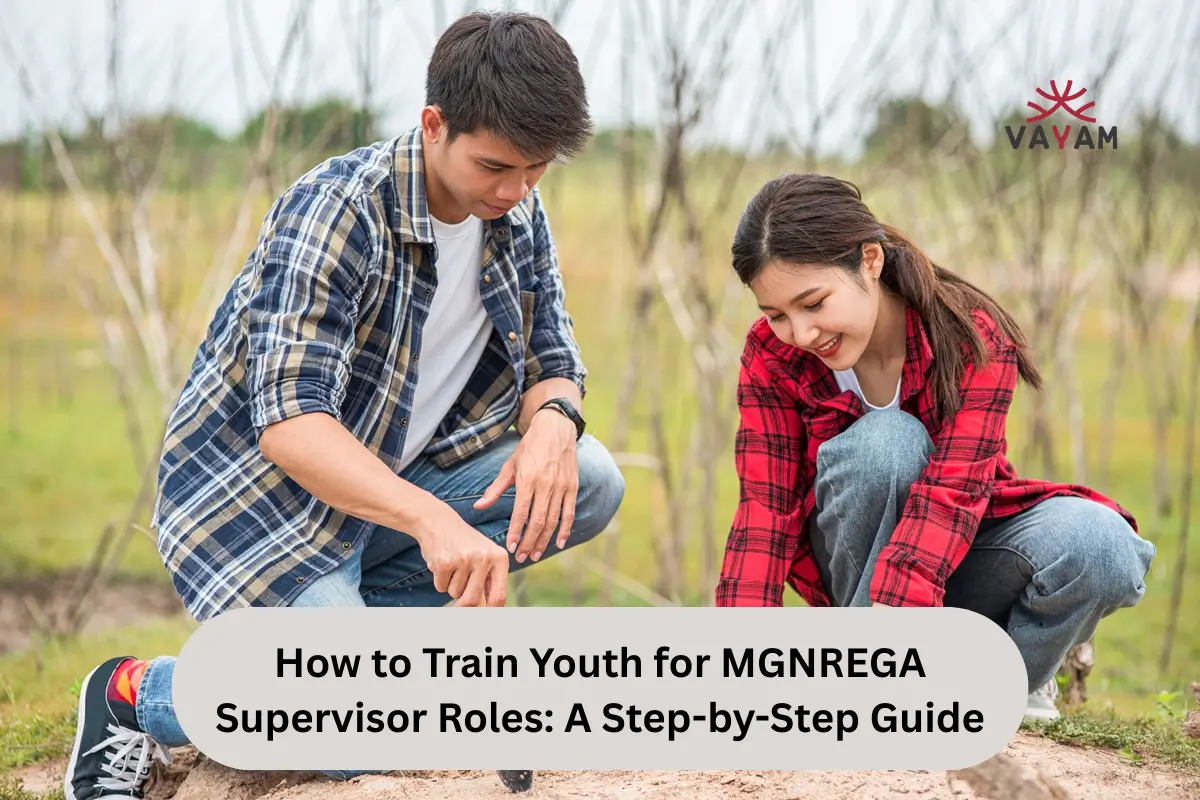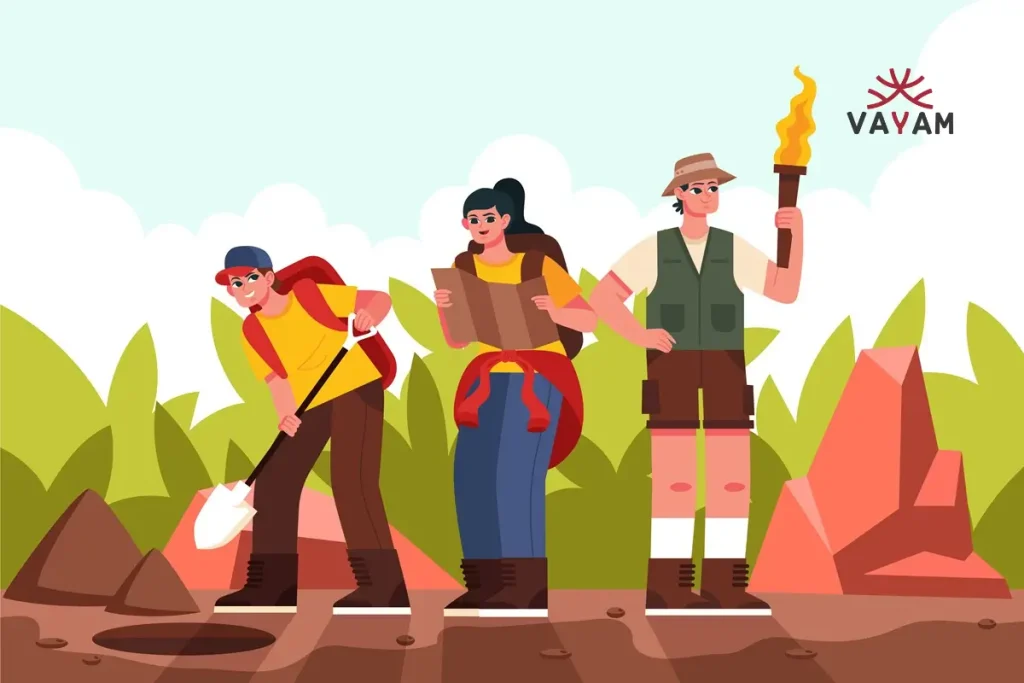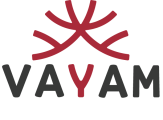
If you’re reading this, you’re probably wondering how to prepare young people for MGNREGA supervisor roles or maybe even looking to guide someone toward a stable, meaningful career. The Mahatma Gandhi National Rural Employment Guarantee Act (MGNREGA) is a game-changer for rural India, providing jobs and boosting local economies.
But becoming a supervisor under this program isn’t just about landing a job it’s about taking on responsibility, managing teams, and making a real difference in your community. The challenge? Many young people don’t know where to start or feel overwhelmed by the skills required.
In this blog, we’ll walk you through a clear, practical guide to training youth for MGNREGA supervisor roles. We’ll address common pain points like lack of confidence, limited resources, or unclear career paths and share actionable solutions to help you or someone you know succeed. Whether you’re a trainer, a parent, or a young person aiming for this role, this 1000-word guide is packed with value to keep you engaged and informed. Let’s get started!
What Is an MGNREGA Supervisor Role?
Before we dive into training, let’s clarify what a supervisor does in MGNREGA. Supervisors oversee rural employment projects, such as building roads, digging wells, or creating irrigation systems. They manage workers, track progress, maintain records, and make sure projects meet government standards. It’s a role that demands leadership, organization, and a knack for problem-solving.
The catch? Many young people feel intimidated by these responsibilities. They worry they lack the experience or education to handle the job. The good news is that with the right training, anyone with dedication and basic skills can thrive as an MGNREGA supervisor. Let’s break down how to make that happen.
Step 1: Build a Strong Foundation with Basic Education
Why It Matters
You don’t need a fancy degree to become an MGNREGA supervisor, but a basic education—typically a high school diploma or equivalent—is usually required. This ensures you can read, write, and handle basic math for tasks like budgeting or measuring project materials.
Pain Point
Many rural youth drop out of school early or struggle with academics, which makes them feel disqualified from supervisory roles.
Solution
If you or someone you’re training lacks formal education, don’t panic. Focus on functional literacy and numeracy:
- Enroll in adult education programs: Many NGOs and government schemes offer free classes to improve reading, writing, and math skills.
- Use mobile apps: Apps like Duolingo (for English basics) or Khan Academy (for math) are free and user-friendly.
- Practice daily tasks: Encourage youth to read local newspapers or calculate household budgets to build confidence.
By starting with these basics, you’re laying a solid foundation for more advanced skills.
Step 2: Develop Leadership and Communication Skills
Why It Matters
As a supervisor, you’ll lead teams of workers, resolve conflicts, and report to higher authorities. Strong communication and leadership skills are non-negotiable.
Pain Point
Many young people feel shy or unsure about leading others, especially if they’ve never held a leadership role before.
Solution
Here’s how to build these skills:
- Join local youth groups: Participating in community organizations or self-help groups helps youth practice speaking up and collaborating.
- Role-play scenarios: Set up mock situations, like resolving a worker dispute or explaining a project plan, to boost confidence.
- Learn active listening: Teach youth to listen to workers’ concerns without interrupting—it builds trust and respect.
Pro tip: Encourage them to watch local leaders or panchayat members in action. Observing real-world examples can inspire and teach them how to handle tough situations.
Step 3: Understand MGNREGA Rules and Processes
Why It Matters
Supervisors need to know the ins and outs of MGNREGA, from wage payments to project guidelines. Without this knowledge, it’s easy to make mistakes that delay work or upset workers.
Pain Point
The program’s rules can seem complex, and many youth don’t know where to find reliable information.
Solution
Make learning about MGNREGA approachable:
- Attend government workshops: Many districts hold free training sessions on MGNREGA for aspiring supervisors. Check with your local panchayat or block office.
- Read official resources: The MGNREGA website (nrega.nic.in) has guides and FAQs in simple language. Print them out if internet access is limited.
- Learn from peers: Connect with current supervisors in your area. Ask them about common challenges and how they manage projects.
To make this fun, create flashcards with key terms like “job card,” “work demand,” or “muster roll.” Quiz youth regularly to reinforce their knowledge.
Step 4: Master Record-Keeping and Reporting
Why It Matters
Supervisors maintain records of attendance, work progress, and expenses. Accurate reporting ensures workers get paid on time and projects stay on track.
Pain Point
Paperwork can feel daunting, especially for those who aren’t used to handling documents or technology.
Solution
Break it down into manageable steps:
- Practice with templates: Use sample muster rolls or expense sheets (available from panchayat offices) to get familiar with formats.
- Learn basic tech skills: Many records are now digital. Teach youth to use simple tools like Microsoft Excel or Google Sheets for data entry.
- Double-check work: Train them to review records for errors before submitting. A small mistake can cause big delays.
If technology is a barrier, start with pen-and-paper exercises and gradually introduce digital tools as they gain confidence.

Read More
How to Verify If a Business Is Truly Child Labour-Free
RTE and Online Education: What Are the Options?
Step 5: Gain Practical Experience Through Volunteering
Why It Matters
Hands-on experience is the best way to prepare for a supervisor role. It helps youth understand real-world challenges and build credibility.
Pain Point
Opportunities to gain experience are often limited in rural areas, and many youth don’t know how to get started.
Solution
Create opportunities for practical learning:
- Volunteer on MGNREGA projects: Even if it’s not a paid role, assisting with tasks like measuring work or distributing job cards builds skills.
- Shadow a supervisor: Ask a local supervisor if youth can follow them for a day or two to observe their work.
- Join community projects: Participate in local initiatives like tree planting or water conservation to practice teamwork and planning.
These experiences not only build skills but also make youth stand out when applying for supervisor roles.
Step 6: Boost Confidence with Mock Interviews
Why It Matters
Many supervisor roles require an interview or selection process. Confidence and clear communication during these stages can make or break a candidate’s chances.
Pain Point
Youth often feel nervous or unprepared for interviews, especially if they’ve never faced one before.
Solution
Prepare them with practice:
- Conduct mock interviews: Ask common questions like “Why do you want this role?” or “How would you handle a worker who refuses to cooperate?”
- Teach body language: Encourage eye contact, a firm handshake, and a calm tone.
- Provide feedback: After each practice session, highlight what they did well and where they can improve.
This preparation will help them walk into interviews feeling ready and capable.
Step 7: Stay Updated and Network
Why It Matters
MGNREGA policies change, and staying informed keeps supervisors effective. Networking with other supervisors or local officials also opens doors to opportunities.
Pain Point
Rural youth often feel disconnected from updates or professional networks.
Solution
Encourage proactive habits:
- Follow local news: Check for MGNREGA updates in newspapers or on community radio.
- Attend meetings: Participate in gram sabha meetings to stay informed and meet key stakeholders.
- Build relationships: Connect with panchayat members, block officials, or NGOs working on rural development.
Networking doesn’t have to be formal—just showing up and being curious can lead to valuable connections.
Common Challenges and How to Overcome Them
Training for MGNREGA supervisor roles isn’t always smooth sailing. Here are some hurdles youth might face and how to tackle them:
- Lack of motivation: Remind them of the job’s impact—stable income, community respect, and a chance to grow.
- Limited resources: Use free or low-cost tools like government workshops, library books, or smartphone apps.
- Fear of failure: Celebrate small wins, like mastering a new skill, to keep them motivated.
Why This Role Matters
Becoming an MGNREGA supervisor isn’t just about a paycheck. It’s about empowering your community, creating jobs, and building a better future. For young people, it’s a chance to step up, gain respect, and develop skills that last a lifetime.
If you’re training youth, you’re not just preparing them for a job—you’re helping them become leaders. And if you’re a young person reading this, know that you have what it takes to succeed. Start small, stay consistent, and don’t be afraid to ask for help.
Final Thoughts
Training youth for MGNREGA supervisor roles is about building skills, confidence, and a sense of purpose. By focusing on education, leadership, program knowledge, record-keeping, hands-on experience, interview prep, and networking, you can set them up for success. The journey might feel challenging, but with the right guidance, anyone can become a capable supervisor.
Ready to take the next step? Share this guide with someone who needs it, or start applying these tips today. Have questions or success stories? Drop them in the comments—we’d love to hear from you!
